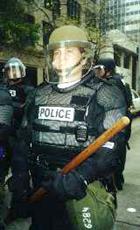 Last week’s strange shooting of an airline passenger in Miami got me to thinking about the current status of our law enforcement system. Traditionally, police work in America has been a local and state affair. The conventional model was that of the local, blue-collar guy who spent much of his time walking the beat and interacting with the public. He rarely got into armed confrontations with civilians, and when he did, it was to stop unambiguously criminal activity.
Last week’s strange shooting of an airline passenger in Miami got me to thinking about the current status of our law enforcement system. Traditionally, police work in America has been a local and state affair. The conventional model was that of the local, blue-collar guy who spent much of his time walking the beat and interacting with the public. He rarely got into armed confrontations with civilians, and when he did, it was to stop unambiguously criminal activity.
 This general archetype was given comedic life by Deputy Barney Fife and Sheriff Andy Taylor, who were Mayberry’s "long arms of the law" on The Andy Griffith Show.
This general archetype was given comedic life by Deputy Barney Fife and Sheriff Andy Taylor, who were Mayberry’s "long arms of the law" on The Andy Griffith Show.
Traditional American Policemen
Unfortunately, as our nation has drifted towards a more aggressive, centralized form of government, the character of policing has changed.
First, law enforcement was relentlessly federalized during the course of the hideous 20th Century. Back when our society actually followed the constitution, the only armed federal law enforcement agents were those of the secret service. They were charged with investigating a narrow spectrum of crimes specifically enumerated in the constitution, such as counterfeiting, treason, and threats against the president.
All of this changed when the government began to discard the constitution’s limitations and moved to consolidate power in Washington. Prior to the FBI, the federal government actually hired private detectives whenever the Secret Service was short-handed. But as the number and intrusiveness of federal laws proliferated during Teddy Roosevelt’s administration, the government began to chafe under a constant shortage of law enforcement agents. As historian John Fox notes:
Prior to 1908, the Justice Department had no organized force of investigators to gather evidence. It relied on detectives hired from the Secret Service and, for a while private detectives. Under President Theodore Roosevelt, this began to change. The vigorous application of older laws and the increase in new ones that occurred during his administration began to tax the Justice Department’s ability to detect crime. In 1906, sixty Secret Service operatives were needed, the next year, sixty-five.
As the "crisis" worsened, calls for new enforcement agencies proliferated. Finally, Attorney General Charles Bonaparte (who says God doesn’t have a sense of humor?) proposed dramatic changes.
Fox continues:
Charles Bonaparte, who was appointed Attorney General in March 1907, quickly became convinced that the practice of using Secret Service investigators was a problem. His lack of complete control over the investigators, he later argued, meant that he "had no direct information as to what they did, and …but an imperfect control over the expenses which they might incur." In his Annual Report, Bonaparte called Congress’s attention "to the anomaly [emphasis mine] that the Department of Justice has no …permanent detective force under its immediate control. He asked that "provision be made for a force of this character; its number and the form of its organization to be determined by the scope of the duties which the Congress may see fit to intrust [sic] to it."
The result was the creation of the FBI.
At first, many Americans expressed dismay that the federal government was treading onto soil that had traditionally been forbidden to it. The consolidation of a federal police force had generally been considered "un-American" and a precursor to "Caesarism." (Note that the attorney general considered the lack of federal agents to be an "anomaly." In a sense, he was correct, given that most systems of government throughout the ages have been despotic and that our republic was unique. But this was clearly not the nuance Bonaparte intended.)
Many were concerned that this development heralded the beginning of the end of our republic.
Teddy Roosevelt swept these concerns aside, citing the need for greater enforcement capabilities on the part of the feds. In so doing, he managed to express an opinion almost diametrically opposite that of our Founding Fathers:
Roosevelt’s position, though not stated at these hearings, was that what was not forbidden by the law was allowed, hence as president, he had wide discretion in marshaling the executive power.
The spirit and intent of the Ninth and Tenth Amendments state that everything not expressly permitted to the federal government was reserved for the states and the people…and everything not expressly forbidden to the states and the people was permitted. Roosevelt, of course, reversed these principles, and heralded the entry of the feds into routine law enforcement.
 Once the camel’s nose was under the tent, the power and scope of federal law enforcement relentlessly expanded, culminating in the siege at Waco and the unprecedented growth of federal power accompanying the passage of The Patriot Act.
Once the camel’s nose was under the tent, the power and scope of federal law enforcement relentlessly expanded, culminating in the siege at Waco and the unprecedented growth of federal power accompanying the passage of The Patriot Act.
Federal law enforcement in action
Now that our government has nearly completed the transformation into empire, the aggressive nature of law enforcement is working its way through the system. The rights of our citizenry are being eroded and the powers of the state are being inexorably expanded.
Two symptoms of this trend are the involvement of the military in civilian law enforcement and the overt militarization of police forces (right down to the local level).
Law enforcement in imperial systems
 The use of the military for civilian law enforcement is an overt sign of degeneration into despotism. This trend accelerated after 9/11 and the Katrina disaster, when numerous prominent lawmakers (and President Bush) called for a significant change in Posse Comitatus (the law which forbids military participation in law enforcement).
The use of the military for civilian law enforcement is an overt sign of degeneration into despotism. This trend accelerated after 9/11 and the Katrina disaster, when numerous prominent lawmakers (and President Bush) called for a significant change in Posse Comitatus (the law which forbids military participation in law enforcement).
As for the militarization of police forces, I was horrified by a recent story from Miami about that city’s new anti-terrorism plan. Curt Anderson of AP described it as follows:
 Police are planning “in-your-face” shows of force in public places, saying the random, high-profile security operations will keep terrorists guessing about where officers might be next.
Police are planning “in-your-face” shows of force in public places, saying the random, high-profile security operations will keep terrorists guessing about where officers might be next.
As an example, uniformed and plainclothes officers might surround a bank building unannounced, contact the manager about ways to be vigilant against terrorists and hand out leaflets in three languages to customers and people passing by, said police spokesman Angel Calzadilla. He said there would be no random checks of identification.
Lest we be too concerned about this plan, an official added the following:
“People are definitely going to notice it,” Deputy Police Chief Frank Fernandez said Monday. “We want that shock. We want that awe. But at the same time, we don’t want people to feel their rights are being threatened. We need them to be our eyes and ears.”
This leaves one at a loss for words.
What could possibly lead people to "feel their rights are being threatened" about a band of ninja-clad paramilitaries surrounding their bank and shoving propaganda in their faces?
When I first read this story, I thought it was a gag…that it was a satirical piece from The Onion.
Tragically, it is not.
Traditional law enforcement is a noble calling and plays a vital role in protecting individual rights. Violent criminals exist in all societies and we should be thankful that there are men and women willing to join the police force and guard against them. But statism is contaminating American law enforcement and causing it to approach the precipice of authoritarianism.
"Protect and serve" is being mutated into "shock and awe."
This is, unfortunately, yet another pothole on our tragic road to empire.




